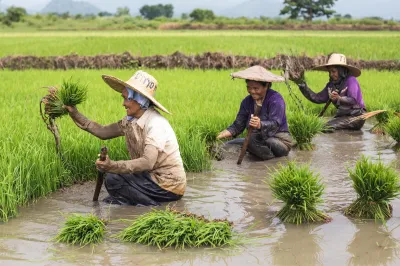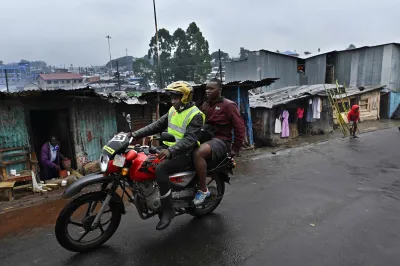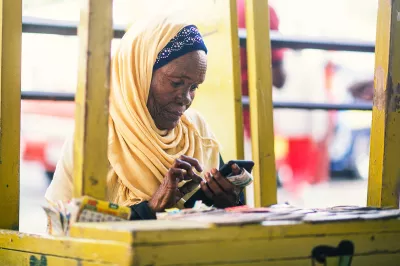Delivering Government Payments in the Wilds of Northern Kenya
This is the fourth post in our series on G2P, branchless banking and financial inclusion. Our first post on Pakistan can be found here, our second post on the Philippines can be found here, and our third post on Colombia can be found here. Our guest blogger for this post is John Ratichek from Bankable Frontier Associates. John leads the development of BFA’s work in social transfer payments. He has done work on the use of technology in mobile phone banking and has written and supervised case studies on the development of financial services in rural Africa.
Forty kilometers east of Lodwar, through the sand and river beds of arid Turkana district in northern Kenya, is the settlement of Turkwell. In the middle of this unforgiving landscape that can hardly support a few goats, “Mama Cash” and her husband run a thriving shop.
Her success is primarily a result of her participation in the Kenyan government’s pilot cash transfer program known as the Hunger Safety Nets Programme (HSNP). But she’s not a beneficiary. Rather, she is one of the two agents in Turkwell who pay cash to the programme’s 250 local recipients. For that service, she receives a commission from Equity Bank who is the administrator of the payment service; and she gleans some additional business from the beneficiaries who often buy goods from her store. Plus, the community has bestowed on her the title she now proudly posts on her storefront.
Mama Cash is one of 120 merchant agents who are being hired and trained by Equity Bank to distribute the HSNP funds. The pilot programme has now been underway for 24 months.
Social transfer programmes all over the globe are recognizing the value of paying cash grants through some form of financial “account”, accounts increasingly administered by a network of payment agents. Agents like Mama Cash can be a vital means of assuring that beneficiaries are fully paid, and in a timely and reliable way.
Fifteen years ago, Equity Bank was a small building society on the brink of collapse. But with a distinctive commitment to providing financial services to unbanked people, Equity transformed itself into one of the leading retail banks in Kenya and now has more than 50% of all bank accounts in the country.
It was this historic commitment to reaching unbanked people that led Equity to bid for the contract with HSNP that almost nobody wanted (read more about CGAP’s involvement in that process here). The odds against successfully distributing the HSNP payments were high. Equity has encountered the technical challenges of installing point-of-sale devices which work off-line in remote villages where electrical power and wireless signals are not available. Rugged geography, lawlessness, nomadic beneficiaries, and distrust among ethnic groups complicate payment operations. Agents who are skilled enough to implement the payment system may also be savvy enough to manipulate it and monitoring agents is a huge challenge in such remote areas.
Despite these challenges, the multiple agencies that compose the HSNP implementation team (Oxfam GB to target, enroll and register beneficiaries; HelpAge International to protect beneficiary rights; Financial Sector Deepening Trust (FSD Kenya) to manage the overall payments component; Equity Bank to make the payments; Oxford Policy Management to provide independent M&E; and DFID to provide funding) have declared the payment system a success.
Challenges remain, of course. One of those is the relatively small number of unsuccessful payments which inevitably plague a system. For advocates of beneficiary rights, anything less than 100% distribution is unacceptable. But it is the challenge of reaching the last few beneficiaries whose fingerprints cannot be read or whose nomadic lifestyle means that they are not aware of the payment schedule that causes the biggest headaches. Manual intervention in the system means that costs rise exponentially and somebody has to bear these costs. If the payment service provider is forced to bear too many of these costs, then it will eliminate the financial incentive necessary for efficient, for-profit businesses like Equity to provide the extraordinary results that they have.
Equity is confident that extension of the agent banking model, initiated through the HSN pilot programme, will result in profitable banking operations. With many more poor people able to participate in the economic system through financial services, Equity’s managers can appropriately continue to say: “The unbanked. That’s what we do!”
You can read more about the Hunger Safety Nets Programme story on the FSD Kenya website here.
- John Ratichek




Add new comment